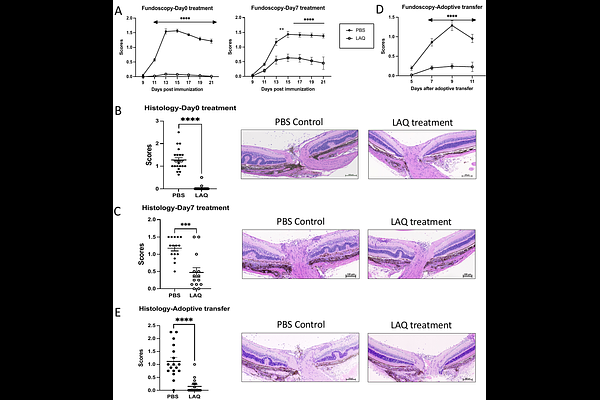Laquinimod treatment attenuates EAU by inhibiting both the inductive and effector phases in an APC-dependent manner

Laquinimod treatment attenuates EAU by inhibiting both the inductive and effector phases in an APC-dependent manner
Xu, B.; Mattapallil, M. J.; Jia, X.; Tang, J.; Horai, R.; Caspi, R. R.; Gery, I.
AbstractPurpose: To evaluate the immunomodulatory effects on experimental autoimmune uveitis (EAU) of the aryl hydrocarbon receptor (AhR) agonist Laquinimod (LAQ), and its active metabolite DELAQ, with a focus on dendritic cell- and T cell-mediated mechanisms. Methods: EAU was induced in mice by active immunization or by adoptive transfer of activated T cells. Mice were treated with LAQ either from the time of immunization or from 7 days after. Effects of LAQ were examined in wild-type, global AhR-knockout, or dendritic cell-conditional AhR knockout mice. Direct vs. indirect effects of AhR agonism on dendritic cells and T cells were studied in vitro using DELAQ, a major active metabolite of LAQ. Results: LAQ treatment from Day 0 fully suppressed EAU, while delayed treatment (Day 7) provided only partial protection. In the adoptive transfer model, LAQ-treated recipients showed reduced pathology. Global AhR-deficient mice developed severe EAU and elevated Th17 responses. LAQ-treated mice displayed increased frequencies of cDC1 and Foxp3+ regulatory T cells. In vitro, DELAQ activated AhR signaling and induced Ido1 and Ido2 expression in dendritic cells. DELAQ inhibited activation of naive and memory mouse T cells APC-dependently, as response to anti CD3/CD28 stimulation was unaffected. Importantly, DELAQ suppressed recall responses of human PBMC to tetanus toxoid. Conclusions: LAQ protects against EAU by acting on AhR-expressing antigen-presenting cells to impair both priming and reactivation of pathogenic T cells. Its active metabolite DELAQ does not suppress T cells directly, but re-programs dendritic cells toward a tolerogenic, IDO-expressing phenotype that promotes immune regulation.